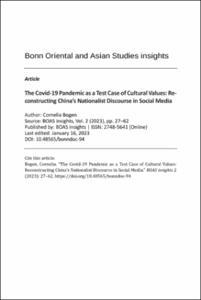Bogen, Cornelia: The Covid-19 Pandemic as a Test Case of Cultural Values : Reconstructing China’s Nationalist Discourse in Social Media. In: BOAS insights. 2023, Vol. 2, 27-62.
Online-Ausgabe in bonndoc: https://doi.org/10.48565/bonndoc-94
Online-Ausgabe in bonndoc: https://doi.org/10.48565/bonndoc-94
@article{handle:20.500.11811/10586,
doi: https://doi.org/10.48565/bonndoc-94,
author = {{Cornelia Bogen}},
title = {The Covid-19 Pandemic as a Test Case of Cultural Values : Reconstructing China’s Nationalist Discourse in Social Media},
publisher = {IOA / BIGS-OAS},
year = 2023,
month = jan,
journal = {BOAS insights},
volume = 2023, Vol. 2,
pages = 27--62,
note = {A variety of nationalisms are said to have emerged worldwide since the Covid-19 pandemic; however, scholars struggle to determine the mutual impact of nationalism and the pandemic, and they do not agree on what constitutes Chinese nationalism in particular. China’s national narratives of the 1990s and digital nationalism in the first decades of the 21st century have highlighted the unique characteristics of Chinese culture, so it comes as a surprise that the vast body of research about China’s Covid-19 pandemic nationalism has not yet determined the specific role cultural factors played in fostering nationalist sentiment. Hence, this article first uses the concept of national identity in Blank et al. as an analysis grid in its literature review to reconstruct a potential shift from patriotism to nationalism within China’s Covid-19 discourse and explore the political and cultural factors that allegedly impacted the handling of the crisis by different countries. Second, a thematic analysis of a randomly selected sample of Chinese media articles and social media posts published in 2020 and 2021 aims to carve out the specific set of values that various Chinese discourse participants – ranging from the political and social elite to ordinary internet users – proclaim to be the reason why China succeeded to contain the first wave of the epidemic.
This literature review shows that the patriotic media campaign, launched after the official announcement of the epidemic, was led by the Chinese Communist Party to counteract Chinese public criticism of media censorship during the outbreak and maintain political stability. After the epidemic became a pandemic and China had successfully contained the first wave, Chinese internet users, as well as political and social elites, jointly engaged in the constructionof a nationalist narrative to counteract international anti-Chinese discourse. Furthermore, this thematic analysis of Chinese social media discourse show cases how Chinese online publics ideologically constructed themselves as a homogeneous group defined by descent, race, and culture. This nourished nationalistic sentiment and helped to establish a boundary to the external other by ascribing the failure of foreign countries to contain the disease to their lack of certain Confucian values. In doing so, Chinese discourse evoked centuries-old Western orientalist stereotypes on ‘Confucianist collectivism’ that they used to foster nationalism while rejecting international criticism. Othering narratives in the pandemic discourse of China and liberal Western countries were based on nationalism, culturalism, racism, and the larger ‘orientalist’ idea of China versus ‘the West’ as homogeneous, transnational and imagined communities.},
url = {https://hdl.handle.net/20.500.11811/10586}
}
doi: https://doi.org/10.48565/bonndoc-94,
author = {{Cornelia Bogen}},
title = {The Covid-19 Pandemic as a Test Case of Cultural Values : Reconstructing China’s Nationalist Discourse in Social Media},
publisher = {IOA / BIGS-OAS},
year = 2023,
month = jan,
journal = {BOAS insights},
volume = 2023, Vol. 2,
pages = 27--62,
note = {A variety of nationalisms are said to have emerged worldwide since the Covid-19 pandemic; however, scholars struggle to determine the mutual impact of nationalism and the pandemic, and they do not agree on what constitutes Chinese nationalism in particular. China’s national narratives of the 1990s and digital nationalism in the first decades of the 21st century have highlighted the unique characteristics of Chinese culture, so it comes as a surprise that the vast body of research about China’s Covid-19 pandemic nationalism has not yet determined the specific role cultural factors played in fostering nationalist sentiment. Hence, this article first uses the concept of national identity in Blank et al. as an analysis grid in its literature review to reconstruct a potential shift from patriotism to nationalism within China’s Covid-19 discourse and explore the political and cultural factors that allegedly impacted the handling of the crisis by different countries. Second, a thematic analysis of a randomly selected sample of Chinese media articles and social media posts published in 2020 and 2021 aims to carve out the specific set of values that various Chinese discourse participants – ranging from the political and social elite to ordinary internet users – proclaim to be the reason why China succeeded to contain the first wave of the epidemic.
This literature review shows that the patriotic media campaign, launched after the official announcement of the epidemic, was led by the Chinese Communist Party to counteract Chinese public criticism of media censorship during the outbreak and maintain political stability. After the epidemic became a pandemic and China had successfully contained the first wave, Chinese internet users, as well as political and social elites, jointly engaged in the constructionof a nationalist narrative to counteract international anti-Chinese discourse. Furthermore, this thematic analysis of Chinese social media discourse show cases how Chinese online publics ideologically constructed themselves as a homogeneous group defined by descent, race, and culture. This nourished nationalistic sentiment and helped to establish a boundary to the external other by ascribing the failure of foreign countries to contain the disease to their lack of certain Confucian values. In doing so, Chinese discourse evoked centuries-old Western orientalist stereotypes on ‘Confucianist collectivism’ that they used to foster nationalism while rejecting international criticism. Othering narratives in the pandemic discourse of China and liberal Western countries were based on nationalism, culturalism, racism, and the larger ‘orientalist’ idea of China versus ‘the West’ as homogeneous, transnational and imagined communities.},
url = {https://hdl.handle.net/20.500.11811/10586}
}






